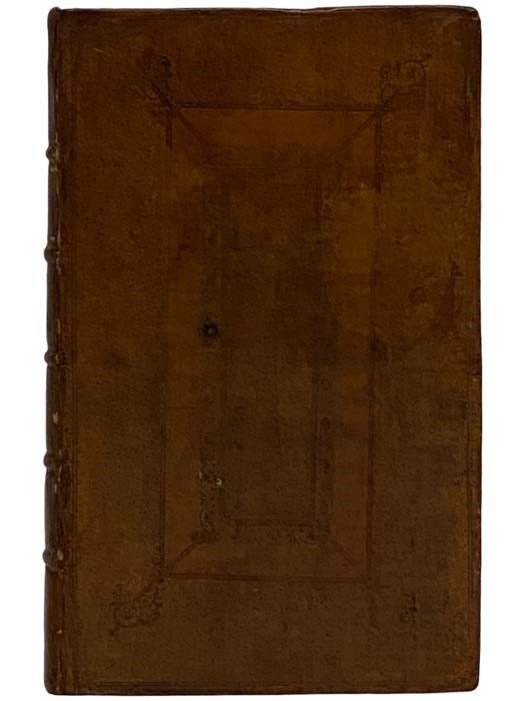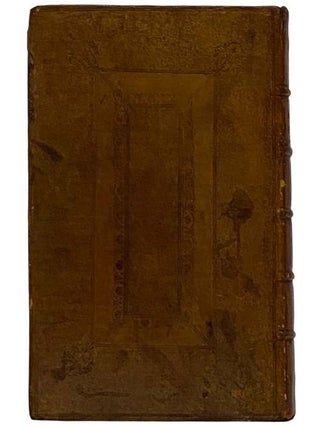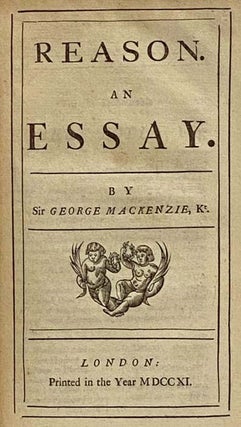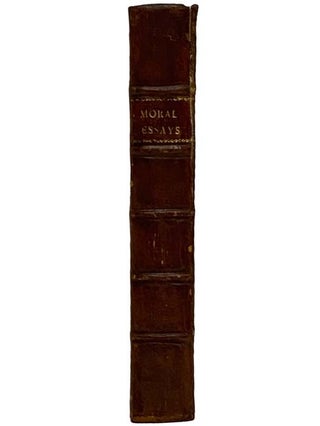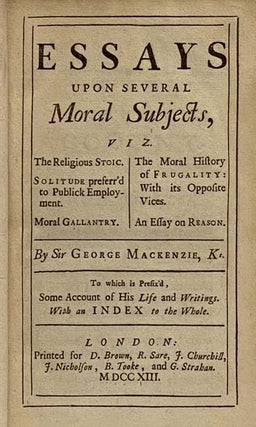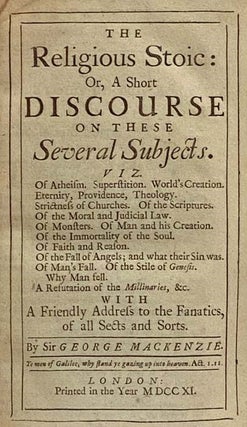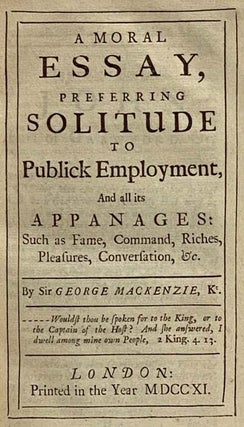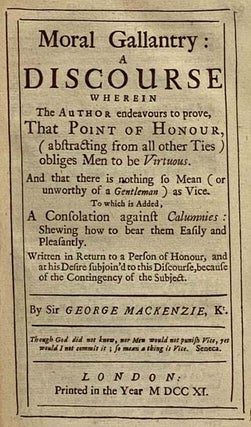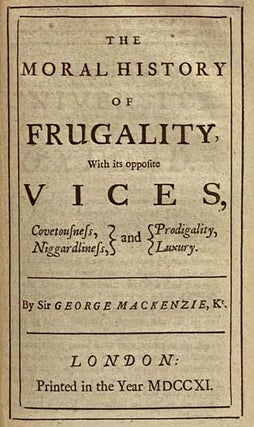Sir George Mackenzie's Moral Essays: Essays upon Several Moral Subjects, Viz.: The Religious Stoic: Or, A Short Discourse on These Several Subjects...; A Moral Essay, Preferring Solitude to Publick Employment, And all its Appanages: Such as Fame, Command, Riches, Pleasures, Conversation, &c.; Moral Gallantry: A Discourse...; The Moral History of Frugality, With its opposite Vices, Covetousness, Niggardliness, Prodigality, and Luxury.; Reason. An Essay.; to which is Prefix'd, Some Account of His Life and Writings. With an Index to the Whole.
London: Printed for D. Brown, R. Sare, J. Churchill, J. Nicholson, B. Tooke, and G. Strahan, 1713. First Edition. Full-Leather. Good / No Jacket. Item #2327127
First thus. ESTC T58751. Front joint just beginning to split, all sewings holding firmly, a few light stains on boards. Text clean and unmarked.
Full calf, gilt titles on spine label, blind-stamped double rule and designs on front and rear boards, gilt decorations on board edges, five raised spine bands. A collection of essays on morality by the noted lawyer and politician whose concern with social order and ethics inform all of these writings. Originally published in the 17th century, this 1713 printing is the first appearance of all five works in a single volume, and includes separate title pages for each work dated 1711. Includes commentary on religious zealotry, atheism, greed, honor, virtue, etc. Full title: Essays upon Several Moral Subjects, Viz.: The Religious Stoic: Or, A Short Discourse on These Several Subjects: Of Atheism. Superstition. World's Creation. Eternity, Providence, Theology. Strictness of Churches. Of the Scriptures. Of the Moral and Judicial Law. Of Monsters. Of Man and his Creation. Of the Immortality of the Soul. Of Faith and Reason. Of the Fall of Angels; and what their Sin was. Of Man's Fall. Of the Stile of Genesis. Why Man fell. A Refutation of the Millinaries, &c., with A Friendly Address to the Fanatics, of all Sects and Sorts.; A Moral Essay, Preferring Solitude to Publick Employment, And all its Appanages: Such as Fame, Command, Riches, Pleasures, Conversation, &c.; Moral Gallantry: A Discourse Wherein the Author endeavours to prove, That Point of Honour, (abstracting from all other Ties) obliges Men to be Virtuous. And that there is nothing so Mean (or unworthy of a Gentleman) as Vice. To which is Added, A Consolation against Calumnies: Shewing how to bear them Easily and Pleasantly. Written in Return to a Person of Honour, and at his Desire subjoin'd to this Discourse, because of the Contingency of the Subject.; The Moral History of Frugality, With its opposite Vices, Covetousness, Niggardliness, Prodigality, and Luxury.; Reason. An Essay.; to which is Prefix'd, Some Account of His Life and Writings. With an Index to the Whole. "Mackenzie, Sir George, of Rosehaugh (1636/1638–1691), lawyer and politician, was born in Dundee either in 1636, as most sources assert, or in 1638, as his own works suggest... To coincide with Charles II's restoration in 1660, Mackenzie published his first work, entitled Aretina, or, The Serious Romance, often regarded as ‘the first Scottish novel'. Defending the didactic value of romance-writing as serving to show 'what should be done', he proceeded to incorporate a thinly veiled allegorical account of the recent civil wars within his tale (preface, 7)... As justice-depute, Mackenzie became involved in the notorious series of trials staged during one of the largest witch-hunts in Scottish history, when, in sixteen months between 1661 and 1662, over 600 people were accused of acts of sorcery and diabolism. While not denying witchcraft's existence, Mackenzie was disturbed by the ways in which he believed 'poor Innocents die in Multitudes by an unworthy Martyrdom, and Burning comes in fashion', and he therefore insisted on the strictest degrees of judicial rigour and impartiality to dispel popular superstition and hysteria (ibid., Sixteenth pleading, 1.89)... Amid recrudescent religious sectarianism, Mackenzie published Religio stoici (1663), attacking 'those mad-cap Zealots of this Bigot Age' (sig. A2r). Reprinted eight times during the Restoration, his tract denounced religious persecution, arguing that to punish 'the body for that which is a guilt of the soul' was as unjust as penalizing one family member for the crime of a relative (ibid., sig. A6r). In 1665 Mackenzie's Moral Essay Preferring Solitude to Publick Employment attracted the attention in London of Abraham Cowley, who allegedly 'sent all about town in vain to get the author' (Vickers, x) before John Evelyn penned a devastatingly skilful rejoinder rejecting Mackenzie's showy elevation of leisure over business... In addition to holding high public office as lord advocate, Mackenzie also sustained an extensive published output that encompassed jurisprudence, imaginative literature, moral philosophy, and political theory. As he himself once acknowledged, 'being bred to the Law … requires a whole Man and his whole Age' (Mackenzie, Works, 2.574), and his reputation as a jurist was pre-eminent. His Institutions of the Law of Scotland (1684) went through nine editions before being replaced as the main textbook for teaching Scots law by John Erskine's Institutions (1758)... Concerned to locate the sources of authority within Scots law, Mackenzie accorded priority to statutes that he deemed 'the chief Pillars of our Law', clearly promulgated by a sovereign lawgiver (Observations, sig. A2r). Believing that the Scottish statutes should be publicly accessible, in 1686 he issued his Observations on the Acts of Parliament from the Time of James I &c., insisting that monarchs were as obliged to laws as subjects. Similar concerns for legal transparency had also underpinned Mackenzie's Laws and Customs of Scotland in Matters Criminal (1678), which provided the first systematic and detailed exposition of Scots criminal law. Prioritizing the authority of penal statutes, Mackenzie's aspiration was 'that nothing were a Crime which is not declared to be so, by a Statute', since that would render 'Subjects inexcuseable, and prevent the arbitrariness of Judges' (Laws and Customs, 1.1.3). With regard to incipient crimes and criminal intention, however, he differentiated between the severity appropriate for public crimes and the potential for leniency in private transgressions. As he conceived it, an individual who allegedly 'designed to commit a [public] crime, should be punished as if he had committed it; if he was only letted by accident, because the Common-wealth cannot otherwise be secure' (ibid., 1.1.4). The preservation of order nevertheless remained Mackenzie's priority in the aftermath of the mid-century civil wars. As domestic unrest escalated from the late 1670s onwards, he privately advised Charles II that, as an absolute sovereign ruling in exceptionally volatile circumstances, he was 'not obliedged to shew a Law for what yow doe' (BL, Add. MS 23244, fol. 20v). As Mackenzie confirmed in A Vindication of his Majesties Government and Judicatures (1683), whatever measures were required to ensure civil peace were rendered lawful, since 'the Necessity of State is that supereminent Law, to which upon occasions all particular Acts must bow' (Mackenzie, Works, 2.350). He was also compelled to justify dispensing with various legal niceties in his capacity as lord advocate. When the admissibility of auxiliary evidence was challenged during the trial of Robert Baillie of Jerviswood in 1684, for example, Mackenzie warned the jury to avoid 'encouraging a civil war, Wherein your selves and your Posterity may bleed', by finding 'the least difficulty' in a case where there were 'Proofs which are stronger than witnesses' (Tryal … of Jerviswood, 36)... Mackenzie was indeed not only 'a man both of the highest honour and of the highest genius and learning', but also an individual 'distinguished no less for his services in government than for the outstanding monuments of his genius' (Mackenzie, Works, preface)." - Oxford Dictionary of National Biography
Price: $1,250.00

